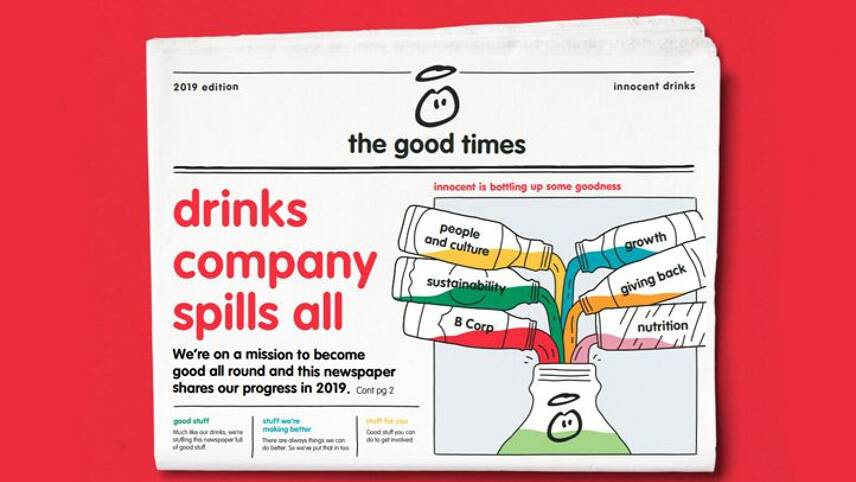Register for free and continue reading
Join our growing army of changemakers and get unlimited access to our premium content

innocent's sustainability cheerleader Katie Leggett talks edie through the report
The “Good all round newspaper” is the company’s first foray into the public reporting sphere on sustainability. The report reflects on the environmental impacts and sustainability performance of the organisation in a written style very much aligned to innocent’s informal yet engaging social media presence.
According to the company’s ‘sustainability cheerleader’ Katie Leggett, the report provided a platform for innocent to transparently share lessons, achievements and struggles in a way to promote new conversations on solving key challenges across the business spectrum.
“Our innocent ‘good all round’ report started out with the ambition of being a sustainability report with a difference,” Leggett tells edie. “As a certified B Corp, we wanted to share more about innocent’s ambitions to become ‘good all round’ and what that means to us. But we realised that sharing our sustainability progress alone wasn’t the full picture.
“For us, being ‘good all round’ is about balancing profit with purpose to make healthy products in a responsible way. We hope by sharing transparently what’s worked and what hasn’t across all these areas of our business, that we can use this report to inspire wider change.”
Progress to date
The report details progress against key sustainability ambitions for innocent.
In November 2019, the company made a commitment to be carbon neutral by 2030, with an intermittent ambition to reduced 10,000 tonnes of CO2e from the business by 2023 by reducing plastic use by 2,500 tonnes.
According to the report, innocent’s carbon footprint was around 275,000 tonnes in 2019, a slightly reduced figure compare to 2017, despite the company growing rapidly.
The report also details that by the end of 2019, 75% of ingredients used in innocent’s drinks range were verified as responsibly sourced through a bespoke SAI-FSA programme. Innocent is aiming to increase the figure to 88% by the end of 2020, 95% by the end of 2021 and 100% by 2023.
With innocent’s supply chain spanning multiple countries and continents – and with on-the-ground growers operating in developing countries – the company has also gone to great lengths to protect and enshrine human rights. By the end of 2019, up-to-date human rights audits had been carried out at 95% of the company’s factory and warehousing suppliers.
But innocent isn’t using the report as a tick-box exercise to merely outline progress against stated targets. Instead, the report also looks at things that didn’t quite work out and what the lessons have been from them.
On the plastics front, innocent is using a minimum of 50% recycled plastic in all of its drinks bottles. It is also aiming to create bottles that don’t use any oil-based plastics.
At the time of the report launch, all innocent juice and smoothie bottles consist of 50% recycled plastics (rPET), with the remaining bottle portfolio to follow by the end of 2021.
Transparency focus
However, innocent was aiming to develop a “zero virgin plastic bottle by 2022”. The report states that the company has realised this ambition is “unrealistic”, but that it would still endeavour to create the bottle. Additionally, a commitment to not fly ingredients in as a means to reduce emissions wasn’t met due to unavoidable circumstances. To compensate, innocent offset the emissions of the flight by spending £13,000 on a project in Brazil that’s tackling deforestation.
For Leggett, the transparency in the report was just as crucial as creating an overall document that could be accessed by numerous stakeholders.
“Personally, I’ve always found that a lot of traditional sustainability reporting can be long, difficult to read and even more difficult to understand,” Leggett adds.
“The brief for this report was to create something that anyone and everyone could (and would) read. Not just the sustainability experts. We wanted this report to interest our people, our fellow B Corps, the wider business community, NGOs, our drinkers, customers, suppliers and everyone in between.”
The report also outlines an update to one of innocent’s more innovative approaches to stakeholder engagement. edie has previously covered the company’s approach to creating a group of “sustainability superheroes” and the report provides an update of how innocent employees are adopting the roles of “Agitator, Ambassador, Activator and Protector” as part of their work objectives.
Alongside the written objectives, the sustainability team has been a key driver in spreading the focus on sustainability across the organisation. Innocent’s sustainability team are all reference in the report and provide advice and insight for readers. The sustainability team was also named as edie’s Team of the Year in the 2019 Sustainability Leaders Awards.
The report details that 86% of employees had a written sustainability objective to work towards. The company is aiming to increase this to more than 90% and the written objectives are being tailored to align with innocent’s B Corp ambitions.
Innocent’s next B Corp audit will take place in 2021, and the company is measuring how it can surpass 100+ points by 2023 across the global business.
“We know we’re just getting started,” Leggett adds. “Our ambition is to keep writing reports each year that people want to read, by finding new and interesting ways to share what we’ve been up to. We’ll continue to be transparent about the good stuff, as well as the stuff that’s still work in progress.”
Matt Mace


Please login or Register to leave a comment.